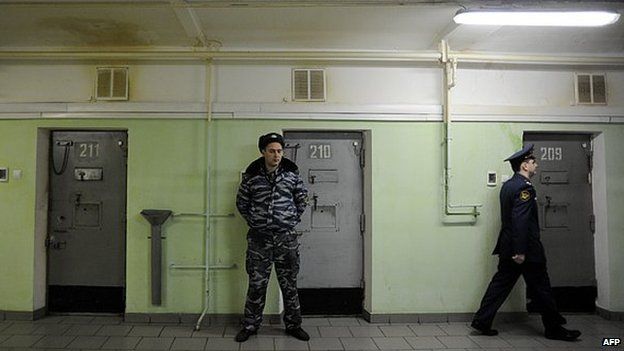Russian police accused of framing drugs suspects
- Published

Russian anti-narcotics officials say that more than 40,000 convictions for drug-related crimes in 2011 show their success in the war on drugs. But human rights activists accuse the police of mass fabrications.
Elena Kuznetsova witnessed the last minutes of her son Roman's liberty. He went from their flat downstairs to meet someone who owed him money for a recently sold scooter.
From a window of their flat, Mrs Kuznetsova saw her son suddenly being manhandled into an unmarked car parked nearby. She managed to run downstairs and followed the car. It took her son to a branch of the Federal Drug Control Service (FSKN) in Khimki, a suburb just outside Moscow.
There, Roman Kuznetsov's bag was taken away from him. An hour later, during the official search, inside the bag were found 18 small packets of hashish hidden in a cigarette pack.
An investigation followed. It did not find her son's fingerprints on the drugs. Experts failed to establish whether separate packets of hash were part of the same batch of drugs.
Defence requests for additional tests were rejected.
"My son was denied the right to present proof of his innocence", Mrs Kuznetsova said.
Nine months later Mr Kuznetsov was found guilty of intention to sell the drugs. He was sentenced to six years in jail.
Mrs Kuznetsova believes the drugs were deliberately planted on her son. She thinks he was framed so that officials would be able to produce good statistics in Russia's so-called war on drugs.
"We often hear reports that in a given year the FSKN has confiscated a huge quantity of drugs. But these stats are all made of small cases, like my son's," she said.
Cases 'not real'
Official figures sound impressive. Drug-related crimes are behind every seventh conviction and every fifth jailing in Russia.
In 2011, more than 42,000 people were sent to prison for selling drugs, intending to do so or keeping large quantities of prohibited drugs.
But human rights activists say fabrications are rife, and that courts, while theoretically independent of the prosecution, turn a blind eye to flawed investigations.
It is alleged that corrupt police and anti-narcotics officers often use the threat of prosecution to extort bribes.
Roman Khabarov, a former police inspector in Voronezh, in central Russia, says that fabricating evidence in drug-related cases has become commonplace.
"I'd say up to 80% of cases relating to the possession of lighter drugs like cannabis are not real. With harder drugs like heroin, it may be lower, but the overall figure is still high," he said.
According to Mr Khabarov, who became a critic of police abuse after his dismissal a year ago, most such cases are driven by officials' desire to produce good statistics.
"This is a crime where you don't have to produce a victim; and so it is very economical to fabricate", he said.
Moreover, he said, police often used the threat of legal proceedings to pressure the suspects into becoming witnesses in other drug investigations.
Paid witnesses
And this was exactly what Mrs Kuznetsova found out while trying to prove her son's innocence. She tracked down relatives of other people who had been investigated by the local branch of the FSKN.
After comparing details of four separate trials, she realised that in all of them the same people were used as witnesses or assisted operatives in undercover purchases of drugs. Since then, several of those witnesses have themselves been put in jail for drug offences.
One of the ex-witnesses now testifies that he gave evidence under pressure. Moreover, the man, himself a drug addict, says operatives rewarded his work with drugs.
Last year, one of the operatives in Roman Kuznetsov's case was arrested, found guilty of possessing heroin and hashish and sentenced to six months in a penal colony.
Mrs Kuznetsova asked the local prosecutor to reopen her son's case, in light of this new evidence.
Her request was denied.
Overseen and controlled
For the head of the Federal Drug Control Service, this settles the matter. Viktor Ivanov points out that his body does not pronounce people guilty or decide upon the sentence - this is all done by the courts.
Mr Ivanov refused to comment on individual cases like that of Roman Kuznetsov.
"Our investigation is overseen by prosecutors, they are independent and they will point out any violations, if those occur," says Mr Ivanov.
He denied that operatives in the lower branches of FSKN were under pressure to provide good statistics.
"Chasing the numbers is wrong. We must concentrate on destroying drug-smuggling infrastructure and when arrests are made it's important not only to confiscate, but to uncover the entire chain of suppliers," he said.
Same witnesses
Vitaly Aptikeev, another resident of Khimki, was accused last year of being part of just such a criminal chain. He was sentenced to nine-and-a-half years for conspiring to sell large quantities of drugs.
But the witnesses used were the same people who testified against Roman Kuznetsov.
Mr Aptikeev's partner, Ekaterina Mischenko, took up his case, finding dozens of inconsistencies and apparent falsifications.
On appeal, the gravest charges were overturned, and eight years were cut from Mr Aptikeev's sentence.
Ms Mischenko says she wants to sue the FSKN for intentionally framing an innocent man.
In a country where fewer than 1% of all trials end in acquittal, the news of Mr Aptikeev's successful appeal has become something of a sensation.
But thousands of others who protest their innocence have little hope of the courts re-examining the charges laid against them.